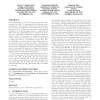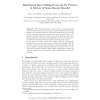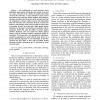10 search results - page 2 / 2 » Recommendation Privacy Protection in Trust-based Knowledge S... |
WWW
2009
ACM
14 years 6 months ago
2009
ACM
Social Networking is one of the major technological phenomena of the Web 2.0, with hundreds of millions of people participating. Social networks enable a form of self expression f...
MADNES
2005
Springer
13 years 11 months ago
2005
Springer
With the rapid advance of the Internet, a large amount of sensitive data is collected, stored, and processed by different parties. Data mining is a powerful tool that can extract ...
DMIN
2009
13 years 3 months ago
2009
-- The proliferation of social networks, where individuals share private information, has caused, in the last few years, a growth in the volume of sensitive data being stored in th...
CCR
2010
13 years 6 months ago
2010
In recent years, academic literature has analyzed many attacks on network trace anonymization techniques. These attacks usually correlate external information with anonymized data...
ACSAC
2010
IEEE
13 years 4 months ago
2010
IEEE
Instruction-set randomization (ISR) is a technique based on randomizing the "language" understood by a system to protect it from code-injection attacks. Such attacks wer...



